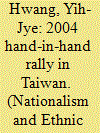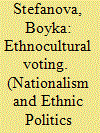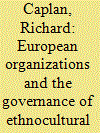| Srl | Item |
| 1 |
ID:
133960


|
|
|
|
|
| Publication |
2014.
|
| Summary/Abstract |
This article investigates how a collective memory of trauma was produced in the course of commemorating the 2-28 Incident in the context of the 2004 election campaign, and how this memory production led to the parallel formation of a Taiwanese national identity. The 2-28 Hand-in-Hand Rally was designed to remember the 2-28 Incident as a historical trauma in order to be forgotten. The remembering of the 2-28 Incident must be regarded as a constructive process as opposed to a retrieval process. The memory of the 2-28 Incident was selectively constituted in favor of sovereign power.
|
|
|
|
|
|
|
|
|
|
|
|
|
|
|
|
| 2 |
ID:
133962


|
|
|
|
|
| Publication |
2014.
|
| Summary/Abstract |
Conventional models of electoral choice explain the ethnic minority vote as a product of nonideological factors, primarily ethnic identities. However, the voting preferences of the minority electorate based on their policy and attitudinal dimensions have not been systematically studied. How are minority interests represented in politics? Although their culturally based proximity to ethnic parties and minority representatives is well established, may we expect the electoral preferences of minorities to also reflect policy positions, economic concerns, or political attitudes? This article sets out to examine the sources and intensity of the electoral preferences of minority voters on the example of electoral support for the Movement for Rights and Freedoms (MRF), a party traditionally regarded as a representative of the ethnic Turkish minority in Bulgaria, a less conventional case of minority participation in politics. Based on analysis of survey data, the article demonstrates that the preferences of the ethnic minority electorate are also the product of policy positions, economic interests, and political attitudes overlapping with social identities. It concludes that the representation of the ethnic minorities through an ethnopolitical party is a stable outcome reflecting the interests of minority voters.
|
|
|
|
|
|
|
|
|
|
|
|
|
|
|
|
| 3 |
ID:
133959


|
|
|
|
|
| Publication |
2014.
|
| Summary/Abstract |
The post-Cold War period to date has witnessed renewed international and especially European preoccupation with issues pertaining to ethnocultural diversity and the challenges for governance arising from these issues. This article discusses the shift that has occurred in support of national minority rights in Europe and why European organizations have become more concerned with these rights after the Cold War. It examines some of the major policy initiatives adopted by European organizations in response to the nearly 25-year long Yugoslav crisis and what these initiatives reveal about new (and old) thinking within these organizations with respect to national minority rights and the management of ethnocultural diversity more generally. It also discusses the consequences of these initiatives for minority rights protection and some of their broader implications for European policy in the future.
|
|
|
|
|
|
|
|
|
|
|
|
|
|
|
|
| 4 |
ID:
133963


|
|
|
|
|
| Publication |
2014.
|
| Summary/Abstract |
This article discusses the relationship between three language communities in Europe with variant levels of official recognition, namely Kashub, Sorb, and Silesian, and the institutions of their host states as regards their respective use, promotion, and revitalization. Most language communities across the world campaign for recognition within a geographic/political region, or on the basis of a historic/group identity to ensure their language's use and status. The examples discussed here illustrate that language recognition and policies resulting therefrom and promoting official monolingualism strengthen the symbolic status of the language but contribute little to the functionality of language communities outside the area. As this article illustrates, in increasingly multilingual societies, language policies cut off its speakers from the political, economic, and social opportunities accessible through the medium of languages that lack official recognition locally.
|
|
|
|
|
|
|
|
|
|
|
|
|
|
|
|
| 5 |
ID:
133961


|
|
|
|
|
| Publication |
2014.
|
| Summary/Abstract |
Using the Finnish National Election Study, this article examines whether one's opinion about immigration is related to the factual knowledge one has about it. Opinion is measured both in terms of a general attitude toward immigration and attitude toward work-related immigration. Contrary to what was expected, low issue saliency and high knowledge about immigration combined to predict pro-immigration attitudes. Additionally, low knowledge about immigration interacted with a disadvantaged labor-market position to predict anti-immigration attitudes. The impact of issue-specific knowledge on opinion seems to come mostly through interactions with other, conditioning, variables. The implications of these findings are discussed.
|
|
|
|
|
|
|
|
|
|
|
|
|
|
|
|